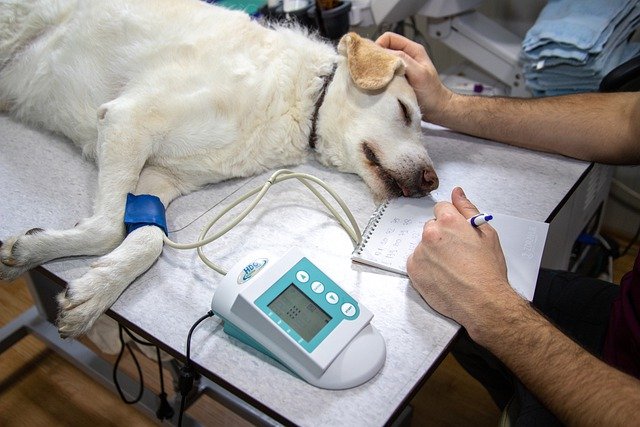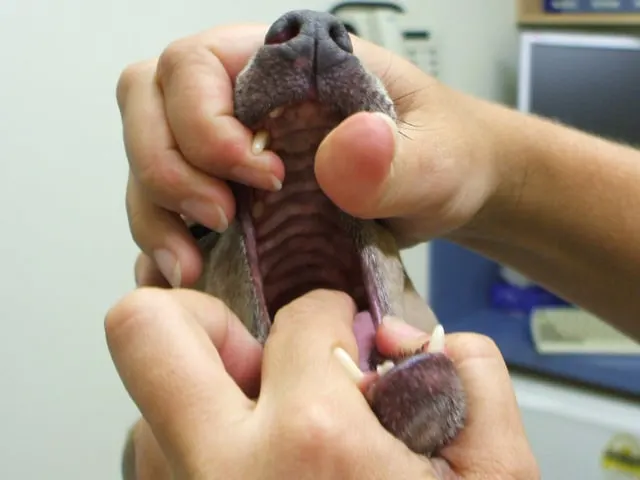The gag reflex, also known as the pharyngeal reflex or laryngeal spasm, is a reflex contraction of the back of the throat, initiated by an irritant in the back of the throat.
The gag reflex is a normal, physiological response that helps to keep foreign objects out of our airways and lungs.
It’s however passive to have an overactive gag reflex that can be triggered by even small amounts of saliva or other liquids.
An overactive gag reflex can cause discomfort and may interfere with normal activities such as eating.
In severe cases, it can lead to vomiting and choking.
Several treatments can help to lessen the intensity of the gag reflex, including desensitization therapy and medications.
Do Dogs Have A Gag Reflex?

Research indicates that similar to humans and other animals, dogs experience the laryngeal spasm or pharyngeal reflex, especially when large objects are forced into their throats.
It is a relief to know that dogs can gag because they are notorious for tasting and eating all manner of things.
If you see your dog gagging, there is a good chance they have eaten a foreign object although they could also be gagging due to eating too fast.
The dog gag reflex is located at the back of the throat.
When something touches the soft palate, it triggers a reflex that causes the dog to gag.
The gag reflex helps to keep foreign objects from entering the lungs.
However, it can also be triggered by food or toys that are too large to swallow.
In some cases, the gag reflex may be so sensitive that it causes the dog to vomit.
If your dog regularly gags or vomits after eating, it’s important to consult with a veterinarian to rule out any underlying medical conditions.
According to PetMd, dogs may also gag just before or after a cough reflex, as a result of the irritation that occurs in their airways.
This is typically a harmless gag and it will stop once the dog coughs.
Just like us, our furry friends will cough to clear the airways of any mucus or debris.
If the coughing happens only once, then you do not need to worry about it.
However, if it persists, then the dog might be sick and you may need to have him checked by the vet.
Some dogs may also have an overactive gag reflex, especially if they become anxious when eating.
This can be triggered by several factors, including a nervous temperament, anxiety or stress, and certain health conditions such as an ear infection.
Symptoms of an overactive gag reflex in dogs may include coughing, retching, and gagging while eating or drinking.
If you see any of these signs in your dog, you may want to consider seeking professional help to determine the underlying cause and help manage his gag reflex.
Gagging can also be a symptom of more serious underlying medical conditions such as gastroesophageal reflux disease (GERD).
GERD occurs when stomach contents rise into the esophagus, causing heartburn and other symptoms.
In dogs, GERD can cause abdominal pain, vomiting, and difficulty swallowing.
If left untreated, GERD can lead to serious health problems such as inflammation of the esophagus and even cancer.
This underscores the importance of monitoring your dog for any signs of persistent gagging and taking them to the vet if you notice any anomaly.
When Should I Take My Dog To The Vet For Gagging?

Just like humans, it is possible for your dog to swallow wrong things and this will most likely be followed by a series of coughs and gags.
For this reason, there is typically no cause for alarm when you first notice your furry baby gagging.
The rule of thumb is to observe the dog for around 48-72 hours to see if the problem persists.
If it was just a case of wrong swallowing of food, it will not recur in this period.
However, if the gag continues, then there may be an underlying cause.
This can be confirmed by looking for other symptoms like anxiety, distress, increased noise during breathing, difficulty in breathing, etc.
Such symptoms typically indicate a problem with the respiratory system and you should therefore take your furry baby for a vet checkup as soon as possible.
Can I Stick My Fingers Down My Dog’s Throat?

Even though dogs have a gag reflex, theirs is quite different from that of humans.
As a consequence, sticking your finger or another object down their throat will not make them vomit.
On the contrary, doing this might actually choke or cause unnecessary throat irritation.
When your dog senses the irritation, its reflex action will be to bite your fingers as a defense mechanism.
That said, experts have explored the possibility of stimulating the gag reflex with a finger and have even succeeded in doing so.
However, the procedure is dangerous both for the one performing it as well as for the dog.
As such, sticking a finger down a dog’s throat is not recommended and only a vet should attempt it and this should only be done to willing patients.
Instead of sticking your finger down your dog’s throat, you should consult a veterinarian or animal behaviorist for advice on how to help reduce the intensity and frequency of their gag reflex.
Learn more here: How to Make a Dog Throw Up With Hands
Several different techniques and medications can be used to minimize or even eliminate gagging in dogs, including desensitization therapy, dietary changes, and behavioral modifications.
Desensitization therapy involves habituating your dog to swallowing smaller amounts of liquid, gradually increasing the volume.
Medications such as antihistamines and antiemetics can also help to reduce gagging.
On the whole, many dogs with an overactive gag reflex can still lead healthy and happy lives with the right treatment plan in place.
If you are concerned about your dog’s gag reflex, it is best to consult a veterinarian or animal behaviorist who can work with you and your pet to develop the best treatment plan possible.
In Summary…
Dogs do have a gag reflex, although it doesn’t necessarily work the same way ours does.
A dog’s gag reflex helps ensure your dog doesn’t shallow or choke on toys and other foreign objects.
But as we have seen, the gag reflex may also be activated by other things, such as stress or a health condition like GERD.
If your dog gags out of the blue and it doesn’t reoccur, there is no cause for alarm.
However, if you notice a recurrence of the gagging after a day or two, then you may want to have him checked out by the vet just to be sure there aren’t any underlying health issues.
You shouldn’t attempt to stick your finger down your dog’s throat as that may irritate the dog causing him to bite you.
It is best to leave such procedures to the vet.
Related Posts:
How to Make A Dog Vomit With Baking Soda
I Gave My Dog Hydrogen Peroxide And He Didn’t Vomit: What Does It Mean?
Why Is My Dog Throwing Up Undigested Food Hours After Eating?
As an Amazon Associate, we may receive a small commission from qualifying purchases but at no extra cost to you. Learn more. Amazon and the Amazon logo are trademarks of Amazon.com, Inc, or its affiliates.

